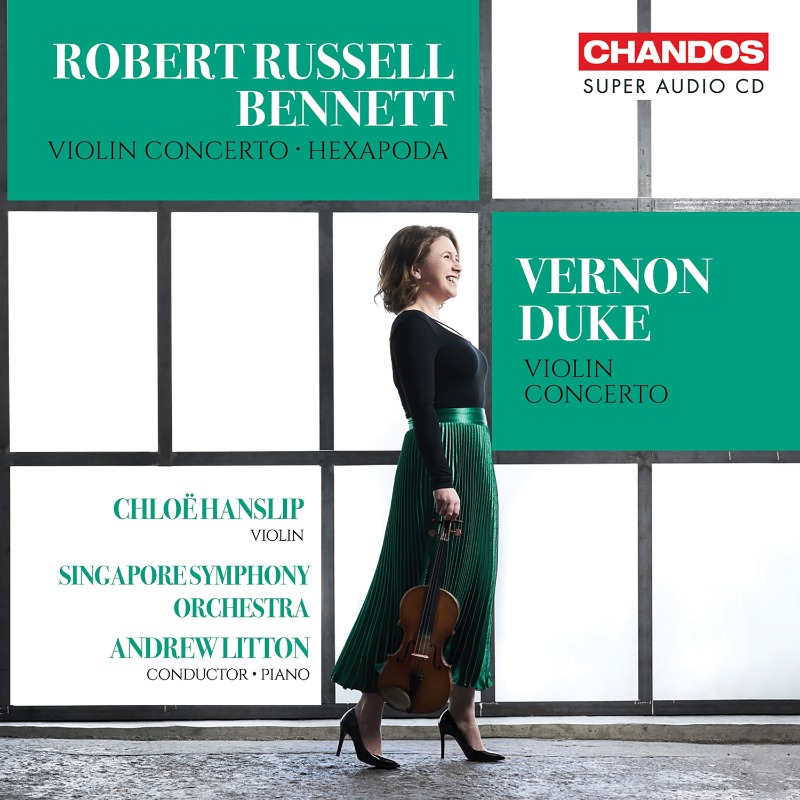search
date/time
 | Yorkshire Times Weekend Edition |

Andrew Palmer
Group Editor
12:00 AM 11th October 2025
arts
Review
Albums: Bennett & Duke Violin Concertos
A Dazzling Discovery: Broadway Masters Step into the Spotlight
Robert Russell Bennett (1894-1981) Violin Concerto Hexapoda (Five Studies in Jitteroptera) Vernon Duke (1903-1969) Violin Concerto
Chloë Hanslip – Violin Singapore Symphony Orchestra Andrew Litton
Chandos CHSA 5371 chandos.net

The names may well be unfamiliar, but the revelation of Robert Russell Bennett's mastery as an orchestrator proves genuinely thrilling. A student of composition under Nadia Boulanger in Paris, Bennett's catalogue encompasses seven symphonies, yet he remains best known for orchestrating some of Broadway's most celebrated musicals, including works by George Gershwin, Cole Porter, and Rodgers and Hammerstein. Richard Rodgers himself modestly acknowledged that Bennett's instrumental wizardry had made his melodies "sound better than they were."
The overall presentation achieves first-class distinction throughout. Chloe Hanslip's profound understanding of the score and her magnificent playing, combined with Andrew Litton's astute direction of the Singapore Symphony Orchestra, culminate in a truly superlative recording. The ravishing, lilting slow movement of Bennett's Violin Concerto marvellously showcases the orchestra's sumptuous strings—close your eyes and you might find yourself transported to a film set. The one-minute-thirty vivace third movement provides an energetic prelude to a rousing finale, throughout which Hanslip demonstrates her formidable virtuosic command.
Vladimir Alexandrovich Dukelsky adopted the name Vernon Duke at the suggestion of his friend Jacob Gershovitz—better known as George Gershwin. Duke received rigorous training in classical music at the Kyiv Conservatory, maintained friendships with Prokofiev, and composed ballet scores for Sergei Diaghilev's Ballets Russes in Paris, alongside three symphonies. Yet he remains better remembered as the creator of hit shows such as Cabin in the Sky and as the composer of numerous songs that became jazz standards, including April in Paris. His concerto proves another triumph. It possesses striking dissonance, whilst the second movement presents a waltz with a delightful pizzicato opening that proves rather beguiling, though it concludes quite brusquely with three chords before flowing into a set of theme and variations. Following a graceful fifth variation featuring exquisite interplay between woodwind and strings, an energetic finale erupts. One detects echoes of Hindemith and Barber, as well as Prokofiev.
Nestled between the two concertos sits the brief, five-movement, jazz-inflected Hexapoda for violin and piano by Bennett, with Litton ably demonstrating his dexterity at the keyboard as well as his conducting prowess. Bennett recalled how, at a dinner party with the Kaufmans—most likely in early 1940—Louis urged the composer to create a work for him, "urging me to compose something that would clothe American dance-hall material in the respectable garments of educated music."
In addressing Kaufman's brief, Bennett—who sensed that jazz's popularity was waning—decided to exploit "something not quite extinct called 'jitterbugs'". Jitterbug (a contraction of 'jittering bug') served as a catch-all term for various fast jazz dances characterised by nervous energy, spectacular leaps, and other dynamic manoeuvres. Bennett coined the delightful term 'Jitteroptera' for the subtitle, whilst the main title, Hexapoda (meaning six-legged), derives from the scientific classification for insects. Splendid entertainment.
Throughout, such abundant orchestral colour emerges, which Hanslip and the orchestra relish with dazzling displays of virtuosity.
A magnificent presentation from Chandos, and one can only hope this heralds a resurgence of interest in these two remarkable composers.